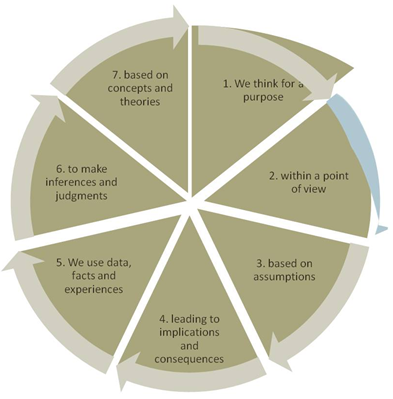Online Course
NDNP 804 - Theory for Evidence-Based Practice
Module 1: Introduction to Philosophy of Science in Nursing
Universal Structures of Thought
As a starting point of our conversation about philosophy of science, let us consider how we answer a question or solve a problem. Whether we realize it or not, we all think about issues from a certain perspective or lens. This lens is unique to all of us and it is something that is created by a number of factors including the rules of the society we grew up in, the laws, religion, our culture, our education, our family and our experience. As adults, we perceive everything in the world from with n this point of view. Our behaviors, ethics and beliefs about what is good, bad, beautiful, ugly, right wrong comes from this point of view. This point of view (or paradigm) is so innate to us that often we do not even realize it. It becomes who we are in a way. Only occasionally do we get a glimpse of it. Usually it is when we meet someone who we completely disagree with them, for whatever reason, such as politics or ethics. We cannot understand how they can be so “off, wrong, different, from a different planet, crazy.”
When most of us come across this kind of situation, we are usually so agitated that we cannot see that we too have a paradigm we are coming from. Our paradigm or philosophy dictates what we see and what we block, what we are open to and what we are not. Our philosophy will deem some ideas as correct, and some as just wrong. From the diagram below you can see that our philosophy comes in many places, whether we realize it or not.

Hawkins, D., Elder, I., & Paul, R. (2010). The Thinkerís Guide to Clinical Reasoning. Tomales, CA: Foundation for Critical Thinking Press.
Our philosophy dictates our point of view, our conclusions, the concepts and theories that resonate with us, and the phenomena of interest to us. Our philosophy also influences what type of research we do or believe to be valid as we look for evidence. Our philosophy of science influences our approach to clinical problems.
| Within a point of view | What do we think? What values do we hold? What assumptions do we come with? What is our philosophy? |
| we use data, facts and experiences | What is our philosophy of science? What is data and how is it collected? |
| to arrive at inferences and judgments | What do we conclude? |
| that are based on concepts and theories | What is our theoretical basis for inquiry? Is it congruent with our philosophy of science? What theories guide our inquiry? |
| and help explain our phenomena of interest. | Are our phenomena of interest congruent with our philosophy of science? |
This website is maintained by the University of Maryland School of Nursing (UMSON) Office of Learning Technologies. The UMSON logo and all other contents of this website are the sole property of UMSON and may not be used for any purpose without prior written consent. Links to other websites do not constitute or imply an endorsement of those sites, their content, or their products and services. Please send comments, corrections, and link improvements to nrsonline@umaryland.edu.